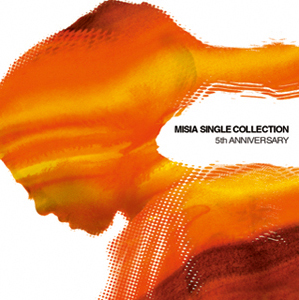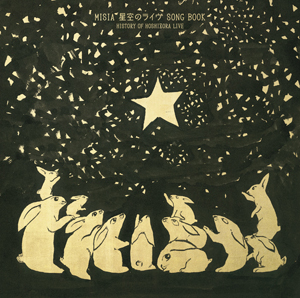
Misia, commonly stylized as MISIA, is a Japanese singer, songwriter, and record producer. Born in Nagasaki, Misia moved to Fukuoka at the age of 14 to pursue a recording career. There, she continued her secondary education and briefly attended Seinan Gakuin University before withdrawing to focus on her musical career. She was signed to BMG Japan in 1997, after auditioning for record producer Haruo Yoda.

The discography of Japanese R&B singer Misia consists of nine studio albums, three compilation albums, one extended play (EP), one live album, six remix albums, twenty-six singles, twelve promotional singles, eighteen video albums and thirty-seven music videos. In 1997, Misia signed a recording contract with BMG Japan and joined the then up-and-coming talent agency, Rhythmedia. Under the sub-label Arista Japan, Misia released her first single, "Tsutsumikomu Yō ni..." in February 1998, followed by "Hi no Ataru Basho" in May. In June, her debut album, Mother Father Brother Sister, opened at number three on the Oricon chart. The album peaked at number one three weeks later and stayed in the top five for eleven consecutive weeks. Mother Father Brother Sister was certified double million and won a Japan Record Award for Best Album, as well as a Japan Gold Disc Award for Pop Album of the Year. In 2000, Misia's second studio album, Love Is the Message, debuted at number one and was certified double million. It won a Japan Record Award for Best Album and a Japan Gold Disc Award for Pop Album of the Year. The album spawned three top ten hits: "Believe," "Wasurenai Hibi" and "Sweetness." Misia's first remix album, Misia Remix 2000 Little Tokyo, was released three months later and shot to number one. It sold over 800,000 copies and is the second best-selling remix album of all time in Japan.

"In My Soul/Snow Song from Mars & Roses" is the thirteenth single by Japanese recording artist Misia. It was released on December 3, 2003 as the second single from Misia's fifth studio album Mars & Roses.

"Namae no Nai Sora o Miagete" is the fourteenth single by Japanese recording artist Misia. It was released on July 7, 2004 as the first and sole single from Misia's sixth studio album Singer for Singer.

"Luv Parade/Color of Life" is the fifteenth single by Japanese recording artist Misia. It was released on July 5, 2006 as the first single from Misia's seventh studio album Ascension.

Misia Remix 2003 Kiss in the Sky: Non Stop Mix is Misia's third remix album, released on April 23, 2003. It sold 31,648 copies in its first week and peaked at #3. Disc one is mixed by DJ Ta-shi whilst the second disc is mixed by DJ Gomi.

Misia Single Collection: 5th Anniversary is Misia's second compilation album, released on December 3, 2003. It sold 52,167 copies in its first week and peaked at #8. Misia Single Collection: 5th Anniversary was released by her previous label, Arista Japan, to commemorate her fifth anniversary.

Mars & Roses is the fifth studio album by Japanese R&B singer Misia, released on February 11, 2004. It debuted at #3 with 151,087 copies sold. The album was recorded in London, New York and Tokyo. The song Little Rose, the title and theme of the album were inspired by Antoine de Saint Exupéry's The Little Prince. Mars & Roses was produced by American songwriter Keith Crouch and includes a duet with Erykah Badu. The first pressing of the album includes a bonus live version of "Snow Song", whose simple piano arrangement was created by Misia's band leader and pianist, Tohru Shigemi, during one of their tour rehearsals.

"Royal Chocolate Flush" is the eighteenth single by Japanese recording artist Misia. It was released on December 5, 2007 as the second single from Misia's eighth studio album Eighth World.

Eighth World is Misia's eighth studio album and first since signing back with BMG Japan, released on January 9, 2008. It includes the singles "Any Love" and "Royal Chocolate Flush" as well as the J-Wave Winter Campaign Holy December, Be in Love with J-Wave image song and theme song to the Japanese release of the movie Bridge to Terabithia, "To Be in Love". The first pressing of the album came in a sleeve case packaging.

"Yes Forever" is the nineteenth single by Japanese recording artist Misia. It was released on April 30, 2008 as the first single from Misia's ninth studio album Just Ballade.

Just Ballade is the ninth studio album by Japanese singer Misia. It was released on December 16, 2009 by Ariola Japan, marking Misia's first album release under the label. The album yielded seven singles, "Yes Forever" and "Yakusoku no Tsubasa", released in 2008, the digital exclusive "Sukoshi Zutsu Taisetsu ni", the double A-side single "Ginga" / "Itsumademo", "Aitakute Ima", and lastly "Hoshi no Yō ni...", released on the same day as the album. Just Ballade was certified Gold by the Recording Industry Association of Japan.

"Aitakute Ima" is a song recorded by Japanese singer Misia, from her ninth studio album, Just Ballade. It was released by Ariola Japan as the album's sixth single on November 18, 2009. "Aitakute Ima" is the theme song to the first season of the TBS drama series Jin.

"Koi wa Owaranai Zutto" is a song recorded by Japanese singer Misia. It was co-written by Misia and Jun Sasaki and produced by Misia. "Koi wa Owaranai Zutto" was released as a single simultaneously with the Tour of Misia Japan Soul Quest concert DVD on June 20, 2012, through Ariola Japan. The title track served as theme song for the NHK drama series Hatsukoi, starring Yoshino Kimura.

Super Best Records: 15th Celebration is the second greatest hits album by Japanese singer Misia. It was released to commemorate Misia's 15th anniversary as a recording artist by Ariola Japan on February 20, 2013, one day shy of her actual 15th anniversary. The three-disc set was released in Blu-spec CD2 format and each disc was remastered by a different music engineer. The compilation includes four reworked tracks, the singles "Koi wa Owaranai Zutto", "Deepness" and "Back in Love Again", and the new song "Holiday", which was released as a promotional single for the album.

New Morning is the eleventh studio album by Japanese singer Misia. The album was released by Ariola Japan on April 2, 2014, the same day as the 77th and final date of Misia's nationwide Hoshizora no Live VII: 15th Celebration concert tour, at the Bunkamura Orchard Hall, which was broadcast live on YouTube. The album yielded the singles "Shiawase o Forever" and "Boku wa Pegasus Kimi wa Polaris". The lead track "Hope & Dreams" was released as a promotional single for the album.

"Orphans no Namida" is a song recorded by Japanese singer Misia. It was released on 25 November 2015 by Ariola Japan as the fifth and final single from her twelfth studio album, Love Bebop (2016). Misia wrote the lyrics and Shirō Sagisu composed, arranged and produced the track. "Orphans no Namida" serves as the first ending theme to the 2015 anime series Mobile Suit Gundam: Iron-Blooded Orphans. In commemoration of the 70th postwar broadcast, Misia performed the album version of "Orphans no Namida" at the 66th NHK Kōhaku Uta Gassen, live from the Nagasaki Peace Park.

Love Bebop is the twelfth studio album by Japanese singer Misia. It was released on January 6, 2016, through Ariola Japan. The title, which is synonymous with love freestyle, was inspired by the evolving LGBT movement in Japan, leading Misia to draw a parallel between the growing societal recognition for all forms of love and the various messages of love depicted on the album. On the album's eponymous title track, Misia quotes former American president Barack Obama, who declared "love is love" in a speech given in the aftermath of the Supreme Court of the United States's landmark decision to legalize same-sex marriage nationwide. The album yielded five singles, "Shiroi Kisetsu" / "Sakura Hitohira", "Orphans no Namida" and the digital exclusive double A-side single "Nagareboshi" / "Anata ni Smile :)".

"Sakura Hitohira" is a song recorded by Japanese singer Misia, from the album Love Bebop. It was released as the album's second single digitally on February 11, 2015, through Ariola Japan. It was released as a limited double A-side CD single alongside the song "Shiroi Kisetsu" a week later, on February 18, 2015. The song was written by Misia, composed by her0ism and Shirose, from the band White Jam, and arranged and produced by her0ism. It was written specifically for the three-night TX drama The Eternal Zero, adapted from the film by the same name and starring Osamu Mukai, for which it serves as theme song.

Misia Hoshizora no Live Song Book: History of Hoshizora Live is the second live album by Japanese singer Misia. It compiles live material, spread out over two discs, collected from the Hoshizora Live concert series, recorded from its first installment in 2001 to the most recent in 2015, in commemoration of the series' 15th anniversary. The double album was released on March 9, 2016, through Ariola Japan.




















